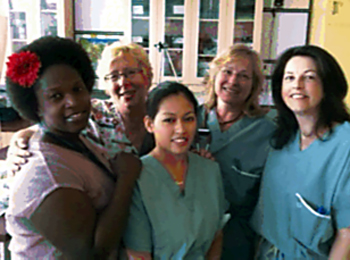Respiratory Therapists of the MCI – Breathing new life into patient care

Dorcas Paul-Emile, Franceen Browman, Khan Le, Pascale Girard and Lucie Goulet
“We had a patient once – a gentleman requiring a respirator for part of the day – who wanted to attend his cousin’s wedding,” says a smiling Dorcas Paul-Emile, McGill University Health Centre (MUHC) respiratory therapist (RT) of the Montreal Chest Institute (MCI). “The rest of the RT team and I made sure he made it to the ceremony on time and I followed him throughout the day in case he needed me. It feels really good to help people like that.”
According to Franceen Browman, assistant chief of Respiratory Therapy at the MCI, a sense of compassion is the single most important quality that a candidate wishing to join the RT team must possess. Browman explains that once an RT passes their exams, the on-the-job knowledge of how to treat patients comes with time and practice. “But compassion and a desire to really care for the lives of others is not something that can be learned on the job,” she explains.
Browman manages approximately twenty RTs, all of whom rotate between clinics, bronchoscopy intensive care and long-term-care patients (who stay at the Institute year round on respirators). The RTs also work hand in hand with patient attendants (PABs). Together they help patients with limited mobility leave their rooms and attend recreational activities. For example, PABs help transfer patients from beds to chairs, while RTs connect them to ventilators.
In some instances, the RTs will accompany the ventilated patients outside the hospital to activities that the patients request. “I was caring for a woman who was staying with us full-time,” recounts Paul-Emile. “When her husband passed away, I helped her make arrangements to attend his funeral, and stayed with her the whole day. It was such a sad moment, but at the same time I am grateful that I could witness her saying her final goodbye. It was, in its own way, very beautiful.”
“As you can imagine, the very physically and emotionally vulnerable nature of our patients demands that RTs have empathy and patience,” says Browman. “We try to give them the best life possible under their unfortunate circumstances.”
Not all patients under the care of respiratory therapists are elderly, however; Paul-Emile recalls the story of a woman in her thirties who required an assisted breathing machine. “She was having complications giving birth, so she was given a caesarian. Unfortunately, when the operation was over, her diaphragm was unresponsive and she could not breathe.” This woman was brought to the MCI where Paul-Emile was one of several RTs that helped care for her. “Slowly over several weeks, we were able to help wean her off the machine and give her the physical strength she needed to return to her family.”
“I love working here and I love helping the patients,” says Paul-Emile. “What keeps me here is the amazing sense of empathy that I see in my colleagues, and the important connections we make.”
Browman is beaming when she speaks of her team. “I am so proud of each individual of the team,” she says. “Of course, the quality of care we give would not be possible without everyone’s involvement, the fantastic PABs, nurses, physicians, physiotherapists, occupational therapists and dieticians that make the MCI the top care centre that it is.”
